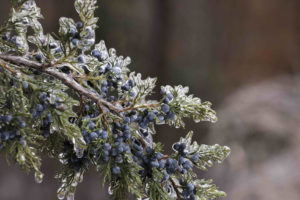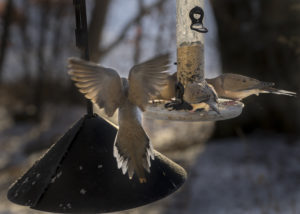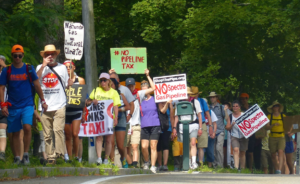Delivered by the Rev. Dr. Margaret Bullitt-Jonas at First Congregational Church, Great Barrington, MA
Psalm 29
Acts 19:1-7
Mark 1:4-11
Baptism and the call to protect Earth
Our Gospel text this morning tells one of the foundational stories of Christian faith, the story of Jesus’ baptism by John in the River Jordan. Before I say one word more, I invite you to take your thumb and to trace the sign of the cross on your forehead. Are you with me? Let’s do it together, once or twice. Let’s make it a prayer, for with grateful hearts we recognize that this simple gesture recalls the fact that our forehead has been indelibly marked with the sign of the cross and that we were baptized in the name of the Holy Trinity – Father, Son, and Holy Spirit. Whether that once-in-a-lifetime event took place many years ago, before conscious memory, when we were babies, or whether it took place more recently, in a ceremony that we remember – through our baptism we have been drawn into the divine life of God and marked as Christ’s own forever.
It’s clear that Jesus’ baptism was a decisive experience, a pivotal event that launched him into his public ministry. The story is told in all four Gospels, and it’s the very first story about Jesus that we hear in the earliest Gospel, the Gospel of Mark. In his baptism, Jesus consciously received the identity that had been his since before the beginning of time: he was, and had always been, the child of God, the beloved of God, and nothing and no one could take that love away. That’s what happens in our baptism, too: like Jesus, we, too, are forever claimed as God’s own. From that moment and for the rest of our lives, we are drawn into the life of God, caught up in an unbreakable relationship of love. Do you ever wonder who you are, who you really are, deep down? Today’s Gospel story gives the answer. Without doing a thing to deserve it or to earn it, you are the son, you are the daughter, you are the beloved of God – you are the one with whom God is well pleased. Wherever you go, whatever you do, wherever the Spirit sends you, the divine life is flowing through you, as close as your breath, as close as your heartbeat. You and I belong to Christ forever, and we are loved to the core.
I don’t know about you, but I find this a deeply consoling truth to hold on to right now, when so many people feel stressed and scattered, anxious or depressed. We live in a turbulent time, and the world is rapidly changing. Sometimes it seems that everything is falling apart, so it’s easy to feel unmoored, ungrounded, and afraid. What a perfect moment to remind ourselves of our baptism and to touch in again to the deep truth that we are God’s beloved daughter or son, and that nothing can separate us from the love of God (Roman 8:35-39)!
Here’s the thing: the love that embraced us in our baptism, the love that flows through us with our every breath – that love extends not only to individuals, not only to the baptized, and not only to human beings. The love of God embraces the whole Creation. Scripture tells us so (e.g. Gen. 1:31; Gen. 9:8-10, 15; Psalm 19:1; Psalm 24:1; John 3:16; Romans 1:20; Ephesians 1:10, Ephesians 4:9-10, Col. 1:19-20), and we glimpse this truth in our own experience. Anyone who has ever been amazed by the beauty of the world – anyone who has ever spent time studying the details of a single leaf, or gazing at a mountain, or looking at the stars on a frosty night knows what it’s like to feel a wave of wonder, humility, gratefulness and awe. The Creator of all-that-is is always disclosing God’s self to us in the natural world, always inviting us to slow down, look carefully, and greet our other-than-human kin.

That’s what Jesus did, I think: he lived close to the Earth, and in the Gospels we often find him outdoors, praying in the desert, walking along a seashore, or climbing a mountain. Here he is in today’s story, plunging into a river! His parables and stories are rich with images of nature: sheep and seeds, lilies and sparrows, weeds and rocks. As I consider Jesus, it seems to me that he encountered every person and creature he met with eyes of discerning love. He saw the inherent sacredness of the created world because he saw with his sacred eyes. He knew that we belong to a living, sacred whole and that everything is lit up with God, because he himself was lit up with God. Jesus knew what poet Gerard Manley Hopkins proclaims: “The world is charged with the grandeur of God.”
So when we see that living world being desecrated – when we see God’s good Earth being poisoned by toxins and pollutants, and laid waste by corporate greed – when we realize that the web of life is unraveling before our eyes and learn from scientists that a mass extinction event is now underway, a “biological annihilation”– when we understand that burning coal, gas, and oil is pushing the planet to break new records for heat, causing droughts, floods, and monster hurricanes, drowning cities, and accelerating wildfires – when we realize that, unless we change course fast, we will not leave our children and our children’s children a habitable world – then we are moved to take action. For we want to bear witness to the love of Jesus; we want to honor the glory of God’s Creation and to protect it from further harm.

I wish I could tell you, as some highly placed but misinformed politicians have recently claimed, that the bitter cold that has gripped North America and the hurricane-force winds that just blasted the East Coast are a sign that global warming is not real. In fact, researchers point out that climate change may well be related to these frigid temperatures: the Arctic is warming rapidly, and the jet stream that once functioned like a strong fence or lasso that held cold air firmly around the pole now seems to be giving way and growing weak. Some scientists compare it “to leaving a refrigerator door open, with cold air flooding the kitchen even as warm air enters the refrigerator.” In any case, except for Canada and the northern United States, just about every other part of the world is warmer than normal. Last year was the second hottest on record for our planet as a whole, just behind a sweltering 2016, which crushed the record set the year before, which in turn crushed the record set the year before that. Sixteen of the seventeen hottest years have all been in this century.
Thank God, there is a lot that we, as individuals, can do. Maybe we can plant a tree. Save a tree. Recycle more. Drive less. Eat local, and move to a plant-based diet. Get our home insulated and get LED lighting. Support local farms and land trusts. Fly less – and, if we must fly, buy carbon offsets. Maybe we can afford solar panels and move toward a carbon-neutral home. You know the drill!
Individual changes make a difference, but because of the scope and speed of the climate crisis, we need more than individual action – we need systemic change. To do that, we’ll need to become politically engaged, to confront the powers-that-be, and to push our elected leaders to awaken from the fantasy that we can continue with business as usual. So some of us carry out peaceful, disciplined actions of civil disobedience to stop construction of new fossil fuel infrastructure and keep fossil fuels in the ground, where they belong. Some of us join Citizens Climate Lobby and push for a national carbon tax, or support legislation right here in Massachusetts that would put a price on carbon. Those of us who are white and privileged listen to the voices of racial minorities, indigenous peoples, and the poor, knowing that they are God’s beloved and that they are the ones hit first and hardest by climate change. Together we intend to build a world in which everyone can thrive.

Here in the Berkshires you are fortunate to have a local node of 350Mass for a Better Future, the grassroots, climate action group that is working hard to build political will to stop new pipelines and move the Commonwealth to 100% clean energy. I hope you’ll sign up with 350Mass and check out a local meeting. Our state politicians see what’s needed, but they are not moving fast enough to stop the damage.
We who have been baptized into the life, death, and resurrection of Jesus Christ intend to bear witness to our God-given faith that life and not death will have the last word. We intend to become the people that God meant us to be: people who are faithful stewards of God’s Creation, people who are a blessing to Earth and all her communities. Jesus took risks to oppose the unjust authorities of his time, and we must do the same.
Here on the first Sunday of the Epiphany we have a chance to make a radical new start. We have a chance to reclaim a covenant more powerful than any stack of New Year’s Resolutions. This morning we celebrate the baptism of Jesus and we affirm the power of our own baptism in His name. We are loved beyond measure by a divine love that will never let us go. Day by day, as long as we live, we have countless opportunities to bear witness to that love. Who knows what compassion will rise up from our renewed commitment, what new cherishing of our selves and each other, what fresh energy for justice seeking and peacemaking in this precious world entrusted to our care?
NOTE: On January 12, 2018, ClimateNexus posted an updated analysis of the relationship between the cold snap and climate change that does not mention changes in the jet stream:
Strange Times for Chilly Temps: The type of extreme cold North Americans experienced in early January has become increasingly rare as the planet warms, a new analysis shows. An initial breakdown of January's cold snap from World Weather Attribution finds such frosty temperatures are now 15 times rarer than they were a century ago, when cold waves were an average of 4 degrees F chillier. This winter's extreme cold "wouldn’t have been that strange" 100 years ago, study co-author Gabriel Vecchi told the AP. "Things like this are becoming stranger." (New York Times $, AP, Washington Post $, Earther, Mashable)
